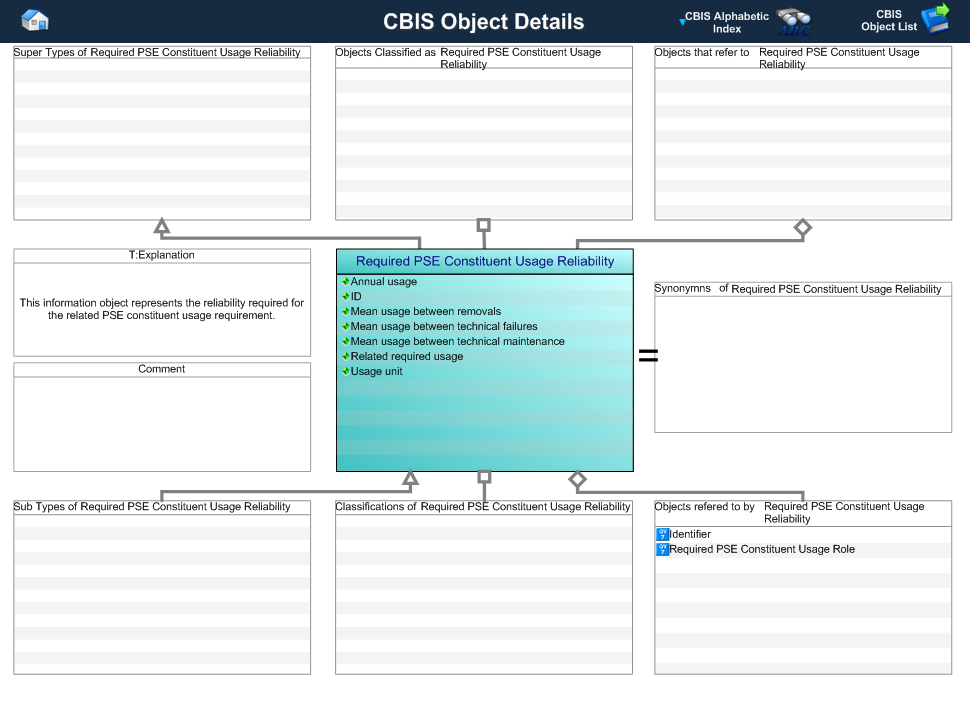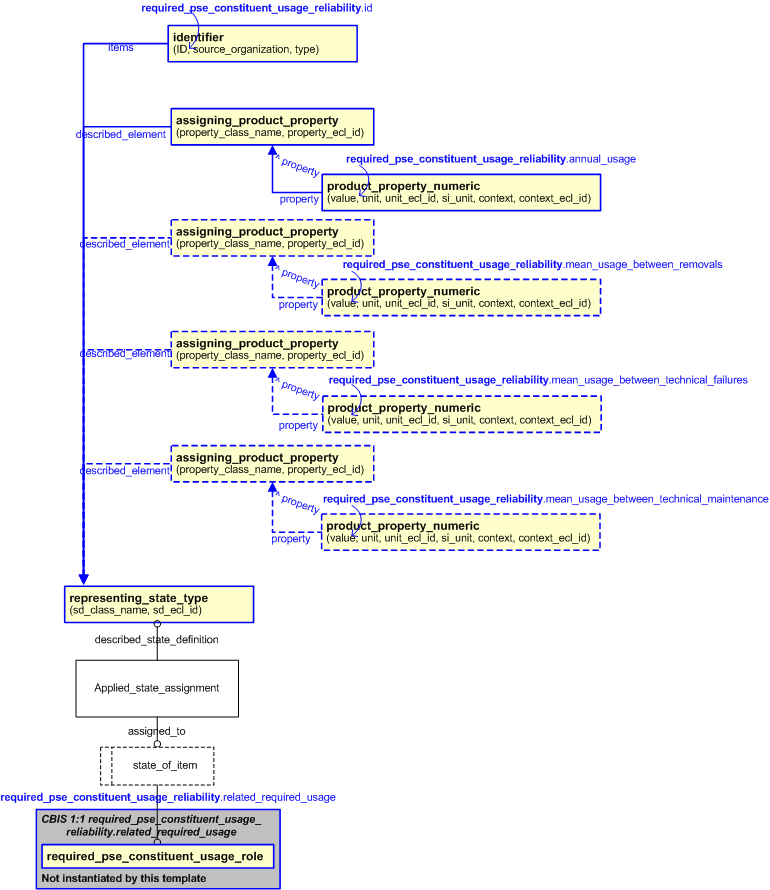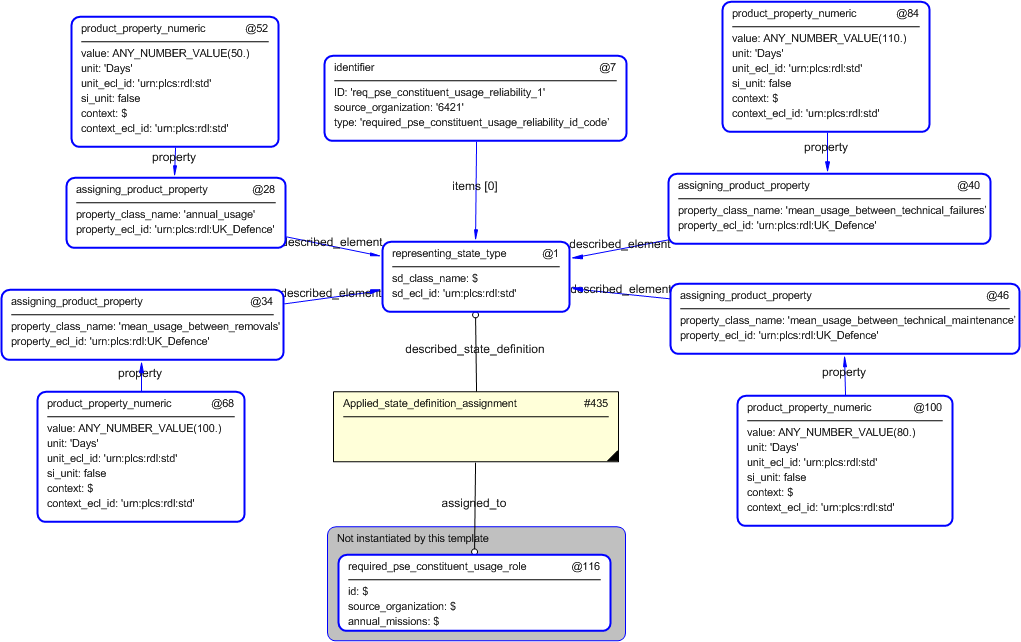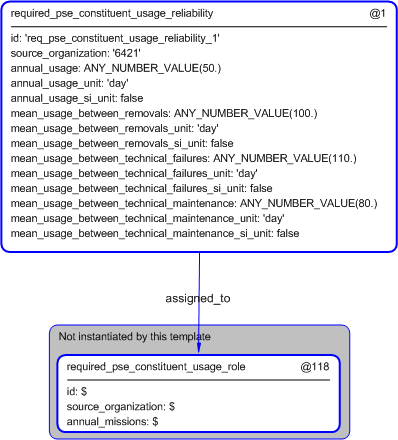Template:— required_pse_constituent_usage_reliability (rpse_ctur)
Context:— UK_Defence |
Date: 2009/04/17 11:32:31
Revision: 1.4
|
This section specifies the template required_pse_constituent_usage_reliability.
NOTE
The template has been defined in the context of
UK_Defence.
Refer to the business context for details of related templates.
NOTE
An explanation of a template and the associated instantiation path is
provided in the
Template overview
section.
This template describes how to represent the reliability required for the related PSE constituent usage requirement.
Figure 1 — Graphical Representation for Business Object required_pse_constituent_usage_reliability
required_pse_constituent_usage_reliability
The definition of a required_pse_constituent_usage_reliability object is:
This information object represents the reliability required for the related PSE constituent usage requirement.
|
Attribute name
|
Attribute description
|
Attribute type
|
Optionality
|
| Annual usage |
This is the required annual usage of the item referenced by the related required usage. |
intrinsic |
Mandatory |
| ID |
This is the identifier of the required usage reliability. |
Identifier |
Mandatory |
| Identifier.id |
This is the value of the id attribute of the Identifier applied to the required usage reliability. |
intrinsic |
Mandatory |
| Identifier.type |
This attribute is the type associated with the id of the Identifier given to the required usage reliability. |
required_pse_constituent_usage_reliability_id_code |
Mandatory |
| Identifier.source_organization |
This attribute is the value representing the source organization that provides the id of the Identifier given to the required
usage reliability. This value is assumed to be a type of Organization_identification_code.
|
Organization_identification_code |
Mandatory |
| Mean usage between removals |
This is the minimum required average usage of the item before any maintenance which results in the removal of an item. |
intrinsic |
Optional |
| Mean usage between technical failure |
This is the minimum required average usage of the item between technical failures.
NOTE: A technical failure is a failure of an item which does not prevent it from carrying out part or all of it's
mission.
|
intrinsic |
Optional |
| Mean usage between technical maintenance |
This is the minimum required average usage of the item between any maintenance performed to mitigate or correct technical
failures.
|
intrinsic |
Optional |
| Related required usage |
This is the reference to the required usage for which the reliability requirements are defined. |
Relationship to Required PSE Constituent Usage Role |
Mandatory |
| Usage unit |
This is the usage unit in which the dependent required usage reliability requirements are measured. |
intrinsic |
Mandatory |
Table 1 — required_pse_constituent_usage_reliability attribute details
The EXPRESS-G diagram in
Figure
2
shows the templates and EXPRESS entities that are required
to represent the template
"required_pse_constituent_usage_reliability".
The text highlighted in blue shows the template parameters.
Figure 2 — An EXPRESS-G representation of the Information model for required_pse_constituent_usage_reliability
The graphic for the template to be used in other EXPRESS-G diagrams
is shown in Figure
3
below.
Figure 3 — The graphical representation of the required_pse_constituent_usage_reliability template
The following input parameters are defined for this template:
This is the reference to the platform, system and equipment constituent for which the related usage profiles are
defined.
This is the identifier of the item of supply.
The organization or information system that created the associated identifier. Alternatively this could be set to /NULL when
Person or Information System is the source; see Identifier template characterizations.
This is the average number of days per year on which the item shall be required to perform a mission.
The class name of the unit in which the mean time to repair value is expressed, probably days or years.
The following classes and their sub-classes can be used:
Value should be set to true if the unit is a SI base unit defined by ISO, i.e.
kilogram (kg) for Mass,
second (s) for Time,
metre (m) for Displacement,
ampere (A) for Electrical current,
kelvin (K) for Temperature,
mole (mol) for Amount of substance, and
candela (cd) for Luminous intensity. If this is not the case it should be set to false.
Note that the representation of true and false depends on exchange format. In Part 11 (a STEP file) true is
represented by the string ".T.", and false by ".F.", while in Part 28 (XML) they are represented by text strings
"true"
and "false".
This is the average time per year where the product has been on standby.
The class name of the unit in which the mean time to repair value is expressed, probably days or years.
The following classes and their sub-classes can be used:
Value should be set to true if the unit is a SI base unit defined by ISO, i.e.
kilogram (kg) for Mass,
second (s) for Time,
metre (m) for Displacement,
ampere (A) for Electrical current,
kelvin (K) for Temperature,
mole (mol) for Amount of substance, and
candela (cd) for Luminous intensity. If this is not the case it should be set to false.
Note that the representation of true and false depends on exchange format. In Part 11 (a STEP file) true is
represented by the string ".T.", and false by ".F.", while in Part 28 (XML) they are represented by text strings
"true"
and "false".
This is the average time per year where the product has been on standby.
The class name of the unit in which the mean time to repair value is expressed, probably days or years.
The following classes and their sub-classes can be used:
Value should be set to true if the unit is a SI base unit defined by ISO, i.e.
kilogram (kg) for Mass,
second (s) for Time,
metre (m) for Displacement,
ampere (A) for Electrical current,
kelvin (K) for Temperature,
mole (mol) for Amount of substance, and
candela (cd) for Luminous intensity. If this is not the case it should be set to false.
Note that the representation of true and false depends on exchange format. In Part 11 (a STEP file) true is
represented by the string ".T.", and false by ".F.", while in Part 28 (XML) they are represented by text strings
"true"
and "false".
This is the average time per year where the product has been on standby.
The class name of the unit in which the mean time to repair value is expressed, probably days or years.
The following classes and their sub-classes can be used:
Value should be set to true if the unit is a SI base unit defined by ISO, i.e.
kilogram (kg) for Mass,
second (s) for Time,
metre (m) for Displacement,
ampere (A) for Electrical current,
kelvin (K) for Temperature,
mole (mol) for Amount of substance, and
candela (cd) for Luminous intensity. If this is not the case it should be set to false.
Note that the representation of true and false depends on exchange format. In Part 11 (a STEP file) true is
represented by the string ".T.", and false by ".F.", while in Part 28 (XML) they are represented by text strings
"true"
and "false".
The following reference parameters are defined for this template:
Allow the
State_definition
entity instantiated in this path to be referenced when this template is used.
%^target = $required_pse_constituent_usage_reliability.required_pse_constituent_usage_reliability%
The instantiation path shown below specifies the entities that are to be
instantiated by the template.
A description of templates and the syntax for the instantiation path is
provided in the
Templates Help/Information section.
/
representing_state_type(
sd_class_name='pse_constituent_usage_reliability',
sd_ecl_id='urn:plcs:rdl:tlss')/
%^required_pse_constituent_usage_reliability = $representing_state_type.state_def%
-- id identifier /
identifier(
ID=@id,
source_organization=@source_organization,
type='required_pse_constituent_usage_reliability_id_code',
items=^required_pse_constituent_usage_reliability)/
Applied_state_definition_assignmentApplied_state_definition_assignment.described_state_definition ->
^required_pse_constituent_usage_reliability
Applied_state_definition_assignment.assigned_to ->
@related_required_usage-- annual_usage /
assigning_product_property(
property_class_name='annual_usage',
property_ecl_id='urn:plcs:rdl:tlss',
described_element=^required_pse_constituent_usage_reliability)/
-- Assign annual_usage reference parameter -- not sure if needed %^annual_usage = $assigning_product_property.property%
-- annual_usage Value and Unit (opted for hours - as couldn't see cbis definition /
product_property_numeric(
value=@annual_usage,
unit=@annual_usage_unit,
unit_ecl_id='urn:plcs:rdl:tlss',
si_unit=@annual_usage_si_unit,
context='Pse_constituent_usage_reliability',
context_ecl_id='urn:plcs:rdl:tlss',
property=^annual_usage)/
-- mean_usage_between_removals /
assigning_product_property(
property_class_name='mean_usage_between_removals',
property_ecl_id='urn:plcs:rdl:tlss',
described_element=^required_pse_constituent_usage_reliability)/
-- Assign mean_usage_between_removals reference parameter -- not sure if needed %^mean_usage_between_removals = $assigning_product_property.property%
-- mean_usage_between_removals Value and Unit (opted for hours - as couldn't see cbis definition /
product_property_numeric(
value=@mean_usage_between_removals,
unit=@mean_usage_between_removals_unit,
unit_ecl_id='urn:plcs:rdl:tlss',
si_unit=@mean_usage_between_removals_si_unit,
context='Pse_constituent_usage_reliability',
context_ecl_id='urn:plcs:rdl:tlss',
property=^mean_usage_between_removals)/
-- mean_usage_between_technical_failures /
assigning_product_property(
property_class_name='mean_usage_between_technical_failures',
property_ecl_id='urn:plcs:rdl:tlss',
described_element=^required_pse_constituent_usage_reliability)/
-- Assign mean_usage_between_technical_failures reference parameter -- not sure if needed %^mean_usage_between_technical_failures = $assigning_product_property.property%
-- mean_usage_between_technical_failures Value and Unit (opted for hours - as couldn't see cbis definition /
product_property_numeric(
value=@mean_usage_between_technical_failures,
unit=@mean_usage_between_technical_failures_unit,
unit_ecl_id='urn:plcs:rdl:tlss',
si_unit=@mean_usage_between_technical_failures_si_unit,
context='Pse_constituent_usage_reliability',
context_ecl_id='urn:plcs:rdl:tlss',
property=^mean_usage_between_technical_failures)/
-- mean_usage_between_technical_maintenance /
assigning_product_property(
property_class_name='mean_usage_between_technical_maintenance',
property_ecl_id='urn:plcs:rdl:tlss',
described_element=^required_pse_constituent_usage_reliability)/
-- Assign mean_usage_between_technical_maintenance reference parameter -- not sure if needed %^mean_usage_between_technical_maintenance = $assigning_product_property.property%
-- mean_usage_between_technical_maintenance Value and Unit (opted for hours - as couldn't see cbis definition /
product_property_numeric(
value=@mean_usage_between_technical_maintenance,
unit=@mean_usage_between_technical_maintenance_unit,
unit_ecl_id='urn:plcs:rdl:tlss',
si_unit=@mean_usage_between_technical_maintenance_si_unit,
context='Pse_constituent_usage_reliability',
context_ecl_id='urn:plcs:rdl:tlss',
property=^mean_usage_between_technical_maintenance)/
The instance diagram in Figure
4
shows an example of the EXPRESS entities and templates that are instantiated by the template:
/required_pse_constituent_usage_reliability(related_required_usage='#116', id='req_pse_constituent_usage_reliability_1', source_organization='6421', annual_usage='50', annual_usage_unit='Days', annual_usage_si_unit='false', mean_usage_between_removals='100', mean_usage_between_removals_unit='Days', mean_usage_between_removals_si_unit='false', mean_usage_between_technical_failures='110', mean_usage_between_technical_failures_unit='Days', mean_usage_between_technical_failures_si_unit='false', mean_usage_between_technical_maintenance='80', mean_usage_between_technical_maintenance_unit='Days', mean_usage_between_technical_maintenance_si_unit='false')/
(an illustration of the consolidated required_pse_constituent_usage_reliability template is shown in
Figure
5 below.)
Figure 4 — Entities instantiated by required_pse_constituent_usage_reliability template
The instance diagram in
Figure
5
shows the graphic symbol for the template that is to be
used in other instance diagrams. The example template is:
/required_pse_constituent_usage_reliability(related_required_usage='#116', id='req_pse_constituent_usage_reliability_1', source_organization='6421', annual_usage='50', annual_usage_unit='Days', annual_usage_si_unit='false', mean_usage_between_removals='100', mean_usage_between_removals_unit='Days', mean_usage_between_removals_si_unit='false', mean_usage_between_technical_failures='110', mean_usage_between_technical_failures_unit='Days', mean_usage_between_technical_failures_si_unit='false', mean_usage_between_technical_maintenance='80', mean_usage_between_technical_maintenance_unit='Days', mean_usage_between_technical_maintenance_si_unit='false')/
Figure 5 — Instantiation of required_pse_constituent_usage_reliability template
Characterizations
No common characterizations of the template
required_pse_constituent_usage_reliability
have been identified. However, the ISO 10303-239 EXPRESS model
may enable other assignments to the entities instantiated by the template.




